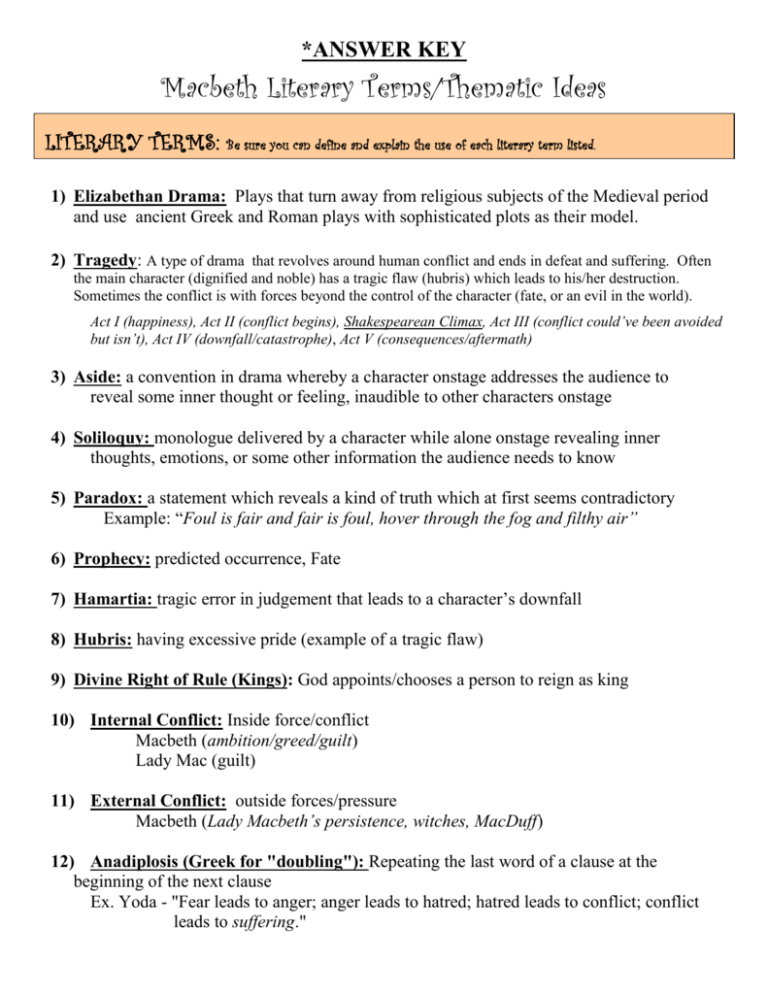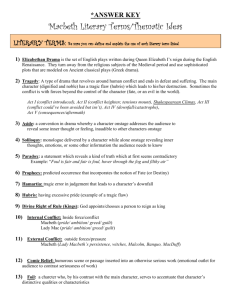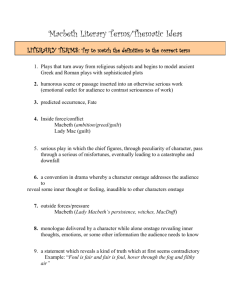ANSWER KEY
advertisement

*ANSWER KEY Macbeth Literary Terms/Thematic Ideas LITERARY TERMS: Be sure you can define and explain the use of each literary term listed. 1) Elizabethan Drama: Plays that turn away from religious subjects of the Medieval period and use ancient Greek and Roman plays with sophisticated plots as their model. 2) Tragedy: A type of drama that revolves around human conflict and ends in defeat and suffering. Often the main character (dignified and noble) has a tragic flaw (hubris) which leads to his/her destruction. Sometimes the conflict is with forces beyond the control of the character (fate, or an evil in the world). Act I (happiness), Act II (conflict begins), Shakespearean Climax, Act III (conflict could’ve been avoided but isn’t), Act IV (downfall/catastrophe), Act V (consequences/aftermath) 3) Aside: a convention in drama whereby a character onstage addresses the audience to reveal some inner thought or feeling, inaudible to other characters onstage 4) Soliloquy: monologue delivered by a character while alone onstage revealing inner thoughts, emotions, or some other information the audience needs to know 5) Paradox: a statement which reveals a kind of truth which at first seems contradictory Example: “Foul is fair and fair is foul, hover through the fog and filthy air” 6) Prophecy: predicted occurrence, Fate 7) Hamartia: tragic error in judgement that leads to a character’s downfall 8) Hubris: having excessive pride (example of a tragic flaw) 9) Divine Right of Rule (Kings): God appoints/chooses a person to reign as king 10) Internal Conflict: Inside force/conflict Macbeth (ambition/greed/guilt) Lady Mac (guilt) 11) External Conflict: outside forces/pressure Macbeth (Lady Macbeth’s persistence, witches, MacDuff) 12) Anadiplosis (Greek for "doubling"): Repeating the last word of a clause at the beginning of the next clause Ex. Yoda - "Fear leads to anger; anger leads to hatred; hatred leads to conflict; conflict leads to suffering." 13) Comic Relief: humorous scene or passage inserted into an otherwise serious work (emotional outlet for audience to contrast seriousness of work) 14) Foil: a charcter who, by his contrast with the main character, serves to accentuate that character’s distinctive qualities or characteristics THEMATIC IDEAS: Be sure you can define and explain the significance of each theme. 15) Weather/Supernatural: witches=thunder/lightning, Duncan’s murder=storm the night before; nature is disordered when evil comes in to play; Natural verses unnatural as well 16) Fate vs. Free Will: predestined or choice (To kill Duncan to speed up process or will it happen anyway? Was it in the cards for Macbeth to kill him?) Fate: Macbeth was fated to kill Duncan regardless of what the witches said. It was all part of the plan/predestination. Free Will: Macbeth made the decision to kill Duncan and take things into his own hands. He would’ve gotten the throne sometime anyway. 17) Appearance vs. Reality: people look and pretend to be different than their inner emotions/motives - QUOTES: “vizards of our hearts,” “no art to find the mind’s construction in the face,” “look like the innocent flower but be the serpent under ‘t” 18) Ambition: 19) Manhood/Masculinity Macbeth Literary Terms 20) Elizabethan Drama: turns away from religious subjects and begins to model ancient Greek and Roman plays with sophisticated plots 21) Tragedy: Tragedy is an imitation (mimesis) of an action that is serious, complete, and of a certain magnitude; [. . . ] through pity [eleos] and fear [phobos] effecting the proper purgation [catharsis] of these emotions. - Act I: state of happiness, height of fame/power - Act II: problem or dilemma *Shakespearean Climax - Act III: CRISIS - Act IV: crisis could be averted but isn’t/disaster Act V: grim consequences of failure 22) Aside: a convention in drama whereby a character onstage addresses the audience to reveal some inner thought or feeling, inaudible to other characters onstage 23) Soliloquy: monologue delivered by a character while alone onstage revealing inner thoughts, emotions, or some other information the audience needs to know 24) Paradox: reveals a kind of truth which at first seems contradictory “Fair is foul, foul is fair 25) Hubris: It is a negative term implying both arrogant, excessive self-pride or self-confidence, 26) Hamaratia: from Greek tragedy that literally means "missing the mark." The protagonist’s tragic flaw, especially a misperception, a lack of some important insight, or some blindness that ironically results from one's own strengths and abilities, which brings about their downfall (Ex. ambition/greed) 27) Internal Conflict: Inside force that has an effect on something (Macbeth’s ambition/greed/guilt) 28) External Conflict: Outside forces that have an effect on something (Lady Macbeth’s persistence) 29) Anadiplosis (Greek for "doubling"): Repeating the last word of a clause at the beginning of the next clause "Fear leads to anger; anger leads to hatred; hatred leads to conflict; conflict leads to suffering." Ex. Yoda - 30) Comic Relief: humorous scene or passage inserted into an otherwise serious work (emotional outlet for audience/contrasts seriousness of work) Ex. the Porter in Macbeth 31) Divine Right of Rule: The belief that the king was chosen by God 32) Foil: a character who, by his contrast with the main character, serves to accentuate that character’s distinctive qualities or characteristics 33) Weather: plays off supernatural ideas / disaster: The Elizabethans believed in a Great Chain of Being and that whenever something in the human world was out of balance, the natural world would react in outbursts of unnatural or extreme events. witches=thunder/lightning, Duncan’s murder=storm the night before; nature is disordered when evil comes in to play (*Natural verses unnatural as well) 34) Fate vs. Free Will choice or predestined? Despite adversity and circumstances, and even fate, everyone is responsible for their own choices and is free to act as they will. Fate: Macbeth was fated to kill Duncan regardless of what the witches said. It was all part of the plan/predestination. Free Will: Macbeth made the decision to kill Duncan and take things into his own hands. He would’ve gotten the throne sometime anyway. 29) Appearance vs. Reality people look and pretend to be different than their inner emotions/motives Ex. “vizards of our hearts,” “no art to find the mind’s construction in the face,” “look like the innocent flower but be the serpent under ‘t” One must never judge other people’s intentions, motivations, or values based on how they appear. Even the most honourable people can change, or manipulate appearances to get what they want.






